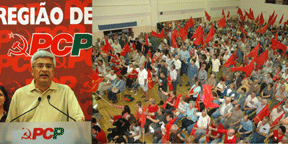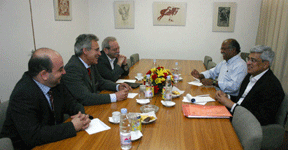 People's Democracy
People's Democracy
(Weekly
Organ of the Communist Party of India (Marxist)
No. 25
June 24, 2007
(Weekly
Organ of the Communist Party of India (Marxist)
|
Vol.
XXXI
No. 25 June 24, 2007 |
TRIP TO GREECE AND PORTUGAL
PCP In Forefront Of The Struggle To Defend Working Class

Prakash Karat addressing a PCP rally at Seixal
Prakash Karat
THE visit to Portugal began on June 3. I reached Lisbon from Athens via Istanbul. The same evening the general secretary of the Portuguese Communist Party (PCP), JerÓnimo de Sousa, hosted a dinner for me. Angelo Alves, member of the Polit Bureau and head of the international department, who accompanied me all through the trip in Portugal, also attended.
During the dinner, I got an idea of the Portuguese economy especially the impact of it being part of the European Union. The farmers are being paid not to produce more crops in certain sectors. This has led to Portugal having to import food. Cork and textile industry have also been adversely affected by the EU directives. By and large, Portugal has fallen behind economically in the EU.
The next day at the PCP headquarters there was an official meeting with JerÓnimo de Sousa and the party leadership. In these talks the PCP leadership explained the situation in Portugal and the European Union. The government is run by the Socialist Party which has an absolute majority but this government is carrying on with the political, social and economic policies which the rightwing governments had pursued in the past decade. The socialist government is doing in many respects what the right could not do.
Under attack were job security, right of collective bargaining and public health services, education was being privileged. The EU guidelines on fiscal deficit have led to loss of national sovereignty. The country was experiencing the highest rate of unemployment in the last two decades of 8.4 per cent. The real rate of unemployment is 10.2 per cent.
The working class is increasingly being pitted against the socialist government. It is in this background that a general strike of workers took place recently on May 30 when 1.4 million workers went on strike. The PCP had just concluded a campaign against “precariousness of labour” i.e. job insecurity and casualisation of work.
The PCP side also gave an assessment of the international situation. It has became a more dangerous, unjust and unsafe world. Resistance to imperialism is a fact particularly in Latin America where major developments have taken place. There is also the attempt to weaken the European social model. They provided a detailed assessment of the various trends within the European Union and the EU-Nato military role. Portugal is going to assume the presidency of the European Union next month at a time when efforts are being made to push through a minimalist EU Constitution where power resides with the bigger countries. The PCP leadership informed me that a meeting of the communist and progressive parties of Europe is being held in Lisbon on July 9 for consultations. The PCP is also of the view that a European party of the Left which would subsume the national communist parties will not lead anywhere.
The meeting was attended by Albano Nunes, member of the Polit Bureau and an old friend well acquainted with the CPI(M) in his earlier capacity as the head of the international department. The meeting was followed by lunch with Albano Nunes where some discussions on issues of mutual interest were continued.

Meeting with JerÓnimo de Sousa General Secretary of the PCP
In the afternoon I departed for Coimbra, a small city 150 kms from Lisbon. Coimbra is home to a famous university set up in the fourteenth century and has the character of a university town. There I met with the leadership of the National Confederation of Farmers (CNA). They gave me an idea of the agrarian situation in the country. In the south of the country there were the latifundia, big landlords, while in the north there were smaller farmers. Some gains were made after the April 1974 revolution when the dictatorship was overthrown. But after integration with the European Union all the gains were lost. What has developed is agro business not agriculture for farmers. Under the EU, support comes at times for intensive production and at other times they are withdrawn. The CNA is playing a leading role in the struggle against transgenic seeds. They explained to me the complex system of subsidies for agriculture in the EU budget.
The highlight was a visit to the Coimbra university. I visited the oldest part of the university which has beautiful buildings. The most astounding is the library which was built in the 18th century, the King John’s library. The bookshelves, the furniture are exquisite, made of guilded and exotic woods. Around 300,000 books of great value, many of them rare, are preserved in this library. I met with two of the vice-rectors of the university.
The next stop was at Figueira da Foz, a seaside town, a short distance away. Here there was a meeting and dinner with the trade union cadres of the party. This was their first get-together after the general strike. I spoke to them briefly conveying our solidarity with the Portuguese working class and trade union movement. After an overnight stay at this popular beach resort, we returned to Lisbon the next morning.
On the third day of the trip I had a meeting and lunch with the leadership of the PCP’s parliamentary group. This was in the Portuguese National Assembly. The PCP has 12 members and its ally the Ecologist Party has two members making a total of 14. They are the third largest group in parliament after the Socialist Party and the rightwing Social Democrats. The PCP’s parliament members are active in all the Party’s campaigns and struggles. The leader of their group is 35 years old.
In my visit to Coimbra and meeting with leaders in the SetÚbal region, I found that a number of young cadres have now taken up major responsibilities. There are two members of the Polit Bureau who are 35 years and below. There are other members of the central committee who are younger.
The chairman of the Assembly, Jaime Gama, who is equivalent to the speaker of the Lok Sabha, met me and we had an interesting discussion about politics and society in Portugal and India.
In the afternoon there was a meeting and debate on the situation in India and international issues with cadres of the Party of the Lisbon Party headquarters. This session was attended by Manuela Bernardino, member of the secretariat and in-charge of International Relations of PCP. The Lisbon party office is housed in a building of architectural interest which was earlier a hotel. The party has preserved well the old architecture of the building. The discussion showed the comrades’ great interest in the communist movement in India and the international situation.
On the fourth and final day, the morning was spent on a tour of Lisbon and sight-seeing. In the afternoon we left for the Barreiro town in the Setubal region. This area south of Lisbon is known as the red belt. Of the eleven municipalities in this region nine have communist mayors. There was a brief meeting with the Mayor and the town council after which we went to the permanent site of the Avante festival. The PCP has a 30 acre estate where it holds the annual festival of its paper Avante. Here I had a meeting with the trade union section of the PCP. I got a briefing on the trade union movement and the work of the CGTP which is the General Confederation of Portuguese Workers. There are 700,000 workers in the union affiliated to the CGPT. Members of the Socialist Party, Catholic organisations and others are in the Confederation. The PCP cadres have a determining influence in the CGTP. The May 30 general strike had drawn a large number of workers who had no job security.
After that the mayor of another municipality, Seixal, hosted a dinner for me alongwith the leadership of the Sétubal party organiation.
After the dinner we proceeded to a party rally organised in a hall in Seixal. This rally was being held in conclusion of the PCP’s campaign against “precariousness of labour”. The main speech at the rally was delivered by the General Secretary of the PCP, JerÓnimo de Sousa. I addressed the rally and conveyed the greetings of the CPI(M) to the PCP and its cadres and supporters. My speech was translated by Aquino Noronha, a comrade of Goan origin. He had left Goa for Portugal when he was 16 years old and has been in the PCP for a number of years. Aquino accompanied me throughout the trip as my interpreter.
By the time I left Lisbon on the afternoon, on June 7, I had acquired a fair idea of the activities and struggles conducted by the PCP. The historic role played by the PCP in the fight against the Salazar dictatorship and fascism is well known. Alvaro Cunhal who led the party through the four decades of underground struggle was a legendary figure. Today the PCP is carrying forward these fine traditions. Firmly rooted in the working class, it is in the forefront of the struggle to defend the interests of the working people of Portugal. It is a party wedded to internationalism and has an important role to play in Europe to rally the Left and progressive forces.